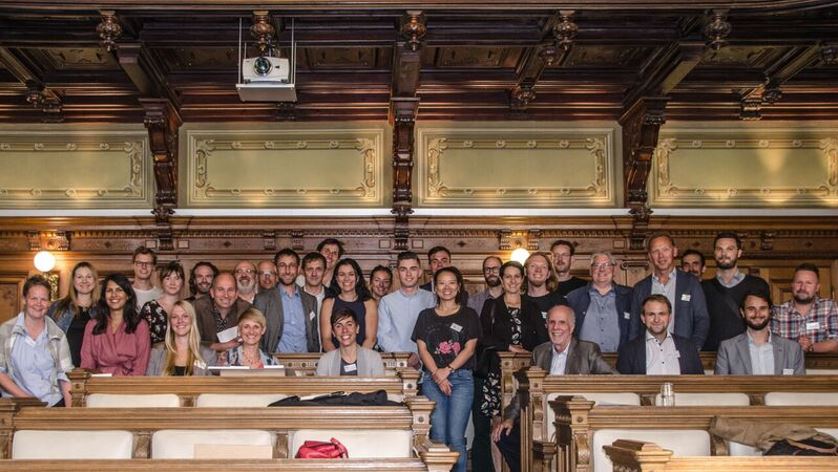Join JPI UE
Faq
FAQ
Please click here for the frequently asked questions we collected.
If you have an additional questions you are welcome to mail us at info@jpi-urbaneurope.eu
Results of 3-years transdisciplinary research co-funded by JPI Urban Europe
From 7-8 June 2017, the URB@Exp project consortium held a final conference in the city of Graz (Austria) to present and discuss the results of this 3-years transdisciplinary research project co-funded by JPI Urban Europe. After an afternoon with field trips facilitated by local city officials and urban lab practitioners, participants enjoyed a full day of workshops by the project partners and keynote lectures provided by Prof. James Evans and urban innovation consultant Remko Berkhout. At the conference, two of the key deliverables were showcased, tested and discussed: a small book with Guidelines for Urban Labs and a LAB kit for (future) urban lab practitioners.
Transdisciplinary set of partners
The URB@Exp consortium strategically merged a transdisciplinary set of partners including four universities, five cities and one SME. These partners contributed a wealth of scientific, professional and experiential knowledge to the collaboration. Under the lead of Prof. René Kemp at ICIS (Maastricht University’s scientific institute for sustainable development), the consortium consisted of eight further partners: the universities of Graz, Malmö and Lund, the cities of Antwerp, Graz, Leoben, Maastricht and Malmö, and the foresight and design company Pantopicon.
Transdisciplinary approach cutting across various disciplines and domains
University and city partners were jointly involved in the design and implementation of the urban lab experiments in the five cities under study, in joint reflexive learning during the experiments, and in evaluating and drawing lessons from the experiments. It is important to note that this concerns all urban stakeholders involved in these urban lab experiments and not the only policymakers of the partner cities. The URB@Exp team applied a transdisciplinary approach cutting across various disciplines and domains, similar to what many urban labs do. As such, URB@Exp was a kind of ‘lab’ as well.
Urban Labs as new forms of urban governance
The innovation component of the project primarily concerned the implementation of urban labs as new forms of urban governance. The city partners from Antwerp, Graz, Leoben, Maastricht and Malmö, as end-users of the guidelines on urban labs, played a major role in defining the research questions to be addressed. Their experiences were essential input for the examination of previous urban lab experiments.
Guidelines to enhance the successful uptake of this new form of urban governance
The URB@Exp project looked at urban labs and new forms of urban governance and city development. Urban labs appear to be a particularly promising, innovative form of governance to address complex urban challenges and create public value. However, policymakers and other urban actors struggle with the implementation of urban labs and seek guidance for their further development. Evidence-based guidelines and design principles are still lacking concerning types of issues for which urban labs are most suited, how urban labs can best be organized in terms of structure, process, and participation, and how urban labs can best be combined and integrated with formal local government structures. The overarching aim of the URB@EXP project was to develop such guidelines, in order to enhance the successful uptake of this new form of urban governance and contribute to improved governance of urban complexity, creating more sustainable, inclusive, attractive, and economically viable cities.
The guidelines are intended for team members and managers of urban labs and, more generally, for civil servants and facilitators in cities working with experimental urban governance processes to tackle complex challenges. They aim to support the everyday practice of collaboratively experimenting and learning how to create more sustainable and inclusive cities. These guidelines do not provide a single definitive answer on ways to organize and run an urban lab or its experimental activities, but rather they offer, through frameworks and examples, guidance for ways to act in relation to, and reflect on, key issues.
“Working together with researchers and other city officials in the URB@Exp research project has proven to be very fruitful for our local practices in Maastricht. Especially the reflexive exercises during the project meetings, the testing of the toolkit and discussions regarding the guidelines. In the period 2017 – 2019, Maastricht-LAB will continue to function as a platform and catalyst for new urban development processes. But we still do not know how Maastricht-LAB will function after 2019. The guidelines and the toolkit will definitely be used for reorientation in the years to come: what should be the future goal of Maastricht-LAB, its functioning in practice and its organizational position? And of course, Maastricht-LAB will continue to participate in the SMULLN project as well, in which we hope to further improve the toolkit and its usefulness.”
(Tim van Wanroij, municipal Maastricht-LAB coordinator , 2014-2017)
Toolkit
The toolkit (including a printed version of the book with guidelines) is aimed at municipalities or other stakeholders in a city who are toying with the idea to set up an urban lab. Through guidelines and materials, the kit supports, inspires and helps to structure multi-stakeholder discussions in a three-phased workshop setting to lay the groundwork for an urban lab for sustainable development in cities.
More information
